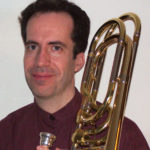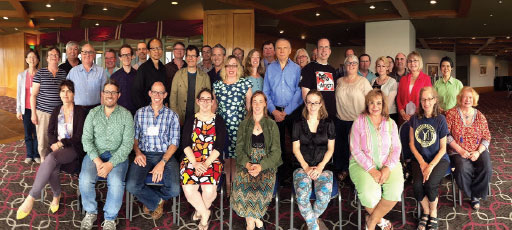
by Robert Fraser, OCSM President and Member of Local 247 (Victoria, BC)
Following up on my column in April’s International Musician (“Where is that Coda Sign?”), the 2021 Organization of Canadian Symphony Musicians (OCSM) Conference will be held online again this summer. We are still in the early stages of emerging from the pandemic, and with our locals’ resources stretched, and uncertainty around travel, it seemed the most prudent decision.
By the time you read this, we will have had two June online meetings with our 21 OCSM delegates, where each gave a brief report on their orchestra’s season activity. Almost all of our orchestras made a dramatic shift to the production of digital content this year. These digital offerings took every form imaginable: self-produced videos, collaborations with third parties, outreach projects, livestreams to care facilities, ticketed livestreamed concerts, and prerecorded offerings shown free of charge with donations encouraged. Despite no earned revenue from large-capacity audiences—the orchestra’s “bread and butter”—many delegates reported that their managements had achieved small surpluses and fundraising/donation campaigns raised more money than expected.
In late May and early June, I was privileged to take part in Orchestras Canada’s series of three online seminars, The Future of the Digital Orchestra. AFM Symphonic Services Division (SSD) Director for Canada Bernard LeBlanc and I were on the steering committee for the project. With the help of OCSM’s delegates, I was able to give a presentation on the third seminar from the musician’s perspective: the challenges of recording versus live performance, the pressures of getting it right, and the problems created by COVID-19 protocols. I carried the message that creating digital content is something we are interested in continuing after the pandemic.
I reported in my last column that we now have an Integrated Media Agreement for Canada (the IMAC) and we hope that more of our orchestras will become signatory to this agreement. As the conversation around our digital presence continues, part of our August conference will centre on that topic. Michael Hodgett of The Arts Firm, facilitator of the Orchestras Canada project, is joining us.
As I have reported in previous columns, in 2017, OCSM voted to support Orchestras Canada’s IDEA Declaration—a commitment on the part of our orchestras to inclusion, diversity, equity, and accessibility. A call for inclusion and diversity must include coming to terms with the uncomfortable facts of current and past events that have created systemic inequalities throughout our nation.
This was driven home recently in Canada with the shocking discovery of the bodies of 215 children buried on the site of a former Indian residential school in Kamloops, British Columbia. While that story was being reported in the news cycle, a Muslim family was brutally murdered in London, Ontario, in a crime that is being prosecuted as an act of terrorism.
As we seek to serve our entire community in all its diversity, we have to confront upsetting truths such as these. It may seem far removed from our abilities as musicians to deal with mass social injustices. However, keep in mind that the history of organized labour has always included a strong social justice element and that the arts have always played a role in healing and bringing communities together. How we do this will certainly be a topic of discussion among our members for many conferences to come.
If this column is being read by orchestral musicians who are not yet part of OCSM, or other musicians interested in our work, the Zoom platform conveniently allows us to open our conferences to more people than we can normally fit in one of our hotel conference rooms. Please keep your eyes peeled for more information on how you can observe some of our sessions, by following us on Facebook and Twitter, and visiting our website: www.ocsm-omosc.org.
La conférence de l’OMOSC aura lieu en ligne, du 4 au 6 août
par Robert Fraser, président de l’OMOSC et membre de la section locale 247 (Victoria, C.-B.)
Pour faire suite à ma chronique du mois d’avril dans l’International Musician, je vous annonce que la Conférence 2021 de l’Organisation des musiciens d’orchestre du Canada se tiendra en ligne encore une fois cet été. En effet, comme nous commençons à peine à sortir de la pandémie, que les ressources de nos sections locales sont très limitées en ce moment et que l’incertitude persiste quant aux possibilités de voyager, il nous a semblé préférable de jouer de prudence.
Au moment où vous lirez ces lignes, nous aurons déjà tenu deux rencontres en ligne avec nos 21 délégués de l’OMOSC afin qu’ils puissent nous présenter un bref rapport de leurs saisons orchestrales respectives. Presque tous les orchestres ont effectué un virage important vers la production de contenu numérique cette année, et ces réalisations ont pris toutes les formes possibles et imaginables : vidéos autoproduites, collaborations avec des tiers, projets dans la collectivité, diffusions en direct dans des centres de soins, diffusions en direct pour public payant et concerts préenregistrés diffusés gratuitement ou contre un don volontaire. Malgré que les orchestres aient été privés des revenus de billetterie – leur pain et leur beurre – auxquels ils sont habitués, de nombreux délégués indiquent que leur administration a dégagé un léger surplus, et que les collectes de fonds ont rapporté plus que prévu.
Fin mai, début juin, j’ai eu le privilège de participer à la série de trois séminaires en ligne d’Orchestres Canada intitulée L’Avenir de l’orchestre numérique. Le directeur des Services symphoniques de la FAM pour le Canada, Bernard LeBlanc et moi-même faisions partie du comité directeur de ce projet. Avec l’aide des délégués de l’OMOSC, j’ai pu donner une présentation du point de vue des musiciens : les défis que présentent les enregistrements par opposition aux concerts, la pression de la réussite et les problèmes que créent les protocoles liés à la COVID-19. J’ai souligné que nous souhaitons continuer à produire du contenu numérique après la pandémie. Dans la dernière chronique, je vous ai indiqué que nous avons maintenant une Entente canadienne sur les médias intégrés, et j’espère que d’autres orchestres de l’OMOSC l’adopteront.
Les discussions relatives à notre présence numérique se poursuivant, nous consacrerons une partie de notre conférence du mois d’août à cette question. Michael Hodgett de The Arts Firm, le facilitateur pour le projet d’Orchestres Canada, se joindra à nous.
Comme je l’ai dit dans des chroniques précédentes, en 2017, l’OMOSC a adopté une résolution d’appui à la déclaration IDEA d’Orchestres Canada — un engagement de nos orchestres envers l’inclusion, la diversité, l’équité et l’accessibilité. L’appel en faveur de l’inclusion et de la diversité doit nécessairement passer par la reconnaissance des faits dérangeants liés aux événements actuels et passés qui ont créé des inégalités systémiques à l’échelle de notre nation.
Cela nous a été rappelé récemment au Canada avec la découverte choquante des 215 corps d’enfants autochtones enterrés sur le site d’une ancienne école résidentielle à Kamloops, en Colombie-Britannique. Et tandis que cette histoire faisait toujours les manchettes, une famille musulmane a été brutalement assassinée à London, en Ontario, un crime qui fait l’objet d’une accusation de terrorisme.
Dans notre volonté de servir notre collectivité dans toute sa diversité, nous devons regarder ces réalités en face. S’occuper de telles injustices sociales de masse peut sembler bien loin de nos compétences de musiciens, mais n’oublions pas que l’histoire de la syndicalisation est fortement tissée de justice sociale, et que les arts ont toujours joué un rôle important dans la guérison et le rassemblement des collectivités. Les moyens d’y parvenir alimenteront sûrement les discussions de nos membres pendant de nombreuses conférences à venir.
Si vous êtes musicien dans un orchestre qui n’est pas encore membre de l’OMOSC ou simplement un musicien qui s’intéresse à notre travail, sachez que la plateforme Zoom nous permet d’ouvrir nos conférences à beaucoup plus de personnes qu’on ne peut normalement en accueillir dans nos salles de conférence d’hôtel. Gardez l’œil ouvert pour en savoir plus sur comment assister à certaines de nos séances comme observateur. Suivez-nous sur Facebook et Twitter, et visitez notre site Web à www.ocsm-omosc.org.



